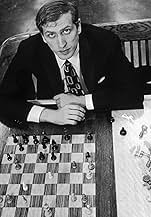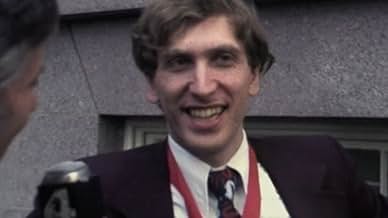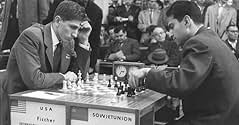Aggiungi una trama nella tua lingua'Bobby Fischer Against the World' is a documentary feature exploring the tragic and bizarre life of the late chess master Bobby Fischer. The drama of Bobby Fischer's career was undeniable, f... Leggi tutto'Bobby Fischer Against the World' is a documentary feature exploring the tragic and bizarre life of the late chess master Bobby Fischer. The drama of Bobby Fischer's career was undeniable, from his troubled childhood, to his rock star status as World Champion and Cold War icon, t... Leggi tutto'Bobby Fischer Against the World' is a documentary feature exploring the tragic and bizarre life of the late chess master Bobby Fischer. The drama of Bobby Fischer's career was undeniable, from his troubled childhood, to his rock star status as World Champion and Cold War icon, to his life as a fugitive on the run. This film explores one of the most infamous and myste... Leggi tutto
- Candidato a 1 Primetime Emmy
- 1 vittoria e 5 candidature totali
- Self
- (filmato d'archivio)
- Self
- (as Dr. Anthony Saidy)
- Self
- (filmato d'archivio)
- Self
- (filmato d'archivio)
- Self
- (filmato d'archivio)
- Self
- (as Fernand Gobet PhD)
Recensioni in evidenza
Garbus's formula is a standard one but succeeds brilliantly here. She juxtaposes archival footage and still photos (much of which, I believe, has never been shown publicly before) with contemporary interviews of many of the key players from Fischer's two-decade pursuit of the title. These individuals - fellow chess players (several of whom were his boyhood friends), tournament organizers, journalists, even his bodyguard - were all members of the small cadre of people that Bobby allowed into his life. Many were even part of his inner circle at Reykjavik. To a person, then, the interviewees were uniquely qualified to share their recollections of Bobby. But, beyond that, they had been positioned to gain some understanding of Bobby. In this film, they share that understanding, or at least their attempts at understanding, of who Bobby Fischer was, and more importantly, why he was that way.
One can only try to imagine the monumental effort required by Garbus to convince them to appear on camera. That she was even able to get Henry Kissinger (now a heavyweight in more ways than one) speaks volumes about her credibility. Kissinger's presence in the film is only one reminder of what was at stake in Reykjavik. Garbus reminds us that this was war: US versus the USSR, capitalism versus communism, freedom versus oppression, each could have been used to describe the battle. But in the end, the only one that really mattered was the title Garbus chose for her work: Bobby Fischer against the World.
Garbus filmed most of the interviews against stunning backdrops of wood-paneled libraries and polished marble floors. In that way she provides quite a contrast for some of the interviewees with their rumpled, 'haven't shaved in three days' look. By doing so, she heightens their humanity, and their humility. Bobby, by contrast, throughout the film, in his words and by his actions, only serves to confirm that he may not have had much of either.
Chess grandmasters Larry Evans and Anthony Saidy, who both knew Bobby since he was a little boy, are not just particularly articulate and insightful, but are also fonts of interesting 'Bobby facts'. Saidy tells us that when Bobby decided to camp out at Saidy's parents' home to avoid the press in the weeks leading up to the World Championship, Saidy's father was dying of cancer. "Bobby, about you staying with us, my dad is sick with cancer". "It's okay, I don't mind", replied the only slightly self absorbed Fischer.
Many of the interviews are with Europeans - Icelanders, Russians, Germans - and all reinforce how impressive it is to hear someone speak fluently in a language other than their native tongue. One has no doubts that their memories and minds must also be sharp. In this context, it is perhaps ironic that LIFE photographer and Scotsman Harry Benson's humanizing photos of Bobby, shown prominently on screen while he speaks, need no words to tell us all we need to know.
Two segments are, each, extraordinary. Saemi Parsson who was Bobby's bodyguard in Reykjavik tells the camera how, after not hearing a word from Bobby in 22 years ("not a peep"), he received the imprisoned Bobby's frantic phone call from Japan (the Japanese had detained Fischer at the request of the US). That Bobby chose to call Parsson, is not quite the correct statement. Rather, that Bobby had no one to call but Parsson seems closer to the truth. We are reminded by this episode that Bobby, by then, was not only stateless, but had severed all relationships with his family and friends. He was alone in more ways than one. The other segment is priceless and is comprised of a faded ABC Wide World of Sports TV special featuring noted sports artist LeRoy Neiman. Neiman, who expected to be "bored to pieces" by the match in Reykjavik draws Fischer as a matador skewering the hapless Spassky! But, can you imagine? ABC's Wide World of Sports? For chess? Such was the impact of Robert James Fischer.
Immediately after beating Spassky, Fischer began his life of seclusion. It may have been even sadder that he also effectively stopped playing chess at the same time, at age 29. All of us are familiar with Fischer's increasingly bizarre post-Reykjavik antics. Sometimes attributed to eccentricity, Garbus makes no secret that she believes Bobby's behaviour was a product of mental illness. Through the images and words of her film, she leaves no other way to label Bobby's paranoia and psychotic pronouncements. She puts the proof right there, in the flickering of a projector, for all to see. We wish it weren't so.
Some say Fischer was the greatest of all players, and there's much evidence to believe the claim. He became the US number one at 15, and bruised the Soviet Union by beating their star man, Boris Spassky. A whole host of current and former chess legends line up in this documentary to declare Fischer the King.
The documentary suggests Fischer was at war with the world, but I think his main enemy was himself. Those inner demons – being told not to advertise his Jewishness, not having a consistent father figure, having fame thrust upon him, being a pawn in Kissinger's government – were lodged in his mind, like the thousands of chess combinations he accumulated since he was six.
Like all good documentaries, this one presents the good and the bad. Fischer's anti-Semitism is on unexpurgated show, as is footage suggesting how others were the cause of his downfall. (The US, his country of birth, first regarded him a national treasure, but later denied him citizenship.) The documentary also does well when expressing the grandeur of chess, and explaining why so many grandmasters over centuries have died or gone mad in their vain quest to discover the secrets of chess.
Even intelligent people I know don't appreciate that chess has no boundaries. 'It's just a game' goes the usual cry. It may be. But it is an infinite game. It is said that its 32 pieces and 64 squares make it possible for there to be a number of possible combinations greater in total than the number of atoms in the universe. It's a game no mortal will ever be able to conquer. Chess is the ultimate victor.
The final line in the documentary, spoken by Fischer, almost made me cry because of the dignified and unemotional way he delivers it. 'Do you think you had a good upbringing?' a faceless reporter asks him. 'It was okay. Could have been more rounded.' There was never a genius without a tincture of madness. In Bobby Fischer's case it was, alas, slightly more than a tincture.
www.scottishreview.net
First she had to portray Fischer's complex character. Since filming started after his death, Garbus had to dig up footage—scattered around the world—and weave together the various strands of Fischer's life. Not only that, she had to gather together all those who played important role in his life.
The second critical obstacle for Grabus was that she had to depict the period where the tension of the Cold War was emerging (because of the Vietnam War), and the whole world was going through major changes, with the entire planet becoming a mortal battlefield. Although chess had started to become popular, the hostility of that time was somehow deeply reflected on the chessboard, and this was soon exploited even more, when the world of politics penetrated into the world of chess.
Garbus' third critical obstacle was that Fischer's life can be divided into three parts: i) his life (and chess career) before 1972, ii) his battle for the title in 1972, and iii) his life after 1972. This means that Fischer's life is often summarized within the boundaries of a single event, stripping away all the aspects that formed his character up to that point. How was Garbus then, going to tell the story of a man who spent half his life playing chess and then disappeared? To overcome these obstacles, Garbus chooses a nonlinear storytelling. Going back—to Fischer's childhood and early years, and then later—forward to his life after the championship games, Garbus uses the 1972 events as the spine of the story.
Visiting Fischer's childhood and adolescence, Garbus shows us his love for (and dedication to) chess, his mother's strong personality, his father's abandonment and absence, and how the precipitate publicity affected his privacy. But what no one mentions in the interviews is that Fischer, at a young age, struggled to gain the respect of others. He was a boy among men, playing (and trying to understand) their game. That struggle was slowly draining away Fischer's childhood (and transforming the first 29 years of his life to a prolonged chess game), the result of which Garbus masterfully displays—at what could be the climax of the film—when she shows Fischer, soon after he won the title, in an amusement park sitting inside a little airplane—flying towards his lost childhood.
The tense climate between the U.S. and the Soviet Union—and its echo in the chess world, is brilliantly shown by Garbus through the rare and previously unseen footage she managed to dig up. Unfortunately, Spassky is the great absentee from this documentary. Although the title of the film is Bobby Fischer Against the World (meaning that Fischer fights against everyone and no one at the same time, indicating that Fischer's whole world is nothing but chess—and Fischer himself is nothing but chess—therefore Fischer's only opponent is Fischer), Garbus mistakenly diminishes Spassky's unique and independent personality by putting him in the same basket with all the others. After all, Spassky was the final external obstacle in Fischer's road to the crown—the one guy he did not yet win. And to paraphrase Thorarinsson, "I think we can agree on the point that Mr. Spassky exists".
However, Garbus does a great job regarding the events of 1972. She leaves out, though, the drama of the two players not having similar chairs (with Fischer's chair being superior to Spassky's), but generally, she covers the events accurately enough: from Fischer's training program, his antics of not showing up, his lists of demands, his growing hatred towards the Soviets, the defending of his principles, the antipathy to cameras and photographers, to his so long-awaited win, Garbus quietly and unpretentiously illustrates the events of the 1972 summer in Iceland.
There is another level in this documentary, a hidden level that Garbus unconsciously created. All the interviewees in the film are trying to label Fischer to a degree that fits their world of understanding. They believe that Fischer should have a particular role in their world, and serve that role in a specific manner.
We are in a society where everyone needs something to have a form in order to understand it. That's why we put labels on everything, and don't let things just be. In that sense, for me, Fischer died in 1972 and reborn after that, as a man with no home and no childhood, trying to play chess on a higher level, the one we all play and eventually lose
Bobby cut his teeth, as it were, at the home of the Collins's, spending an inordinate amount of spare time with them as a young child. In their home, he learned from Jack -- a New York State Champion, an editor of "Modern Chess Openings," (America's leading précis on opening play), a respected Correspondence Chess player, and the dean of American Chess Teachers -- and he received needed motherly sustenance from Jack's sister Ethel.
The Rev. William Lombardy was Fischer's "second" in Reykjavik. It is he who fought the battles for Bobby with the administrators and the arbiters. By his doing so, Bobby could stay somewhat in the background getting his needed rest. The tension and responsibilities lay on the broad shoulders of the Rev. Lombardy, who did a magnificent job on the front lines acting for the Mercurial Mr. Fischer. The full story of Bobby Fischer cannot be adequately told without these three Fischer companions making some contribution to his film life.
Given these three omissions one has the right to ask why Susan Polgar is represented as a Fischer expert. She was but three years old when the Fischer-Spassky match was played, and though she may have had later social connection with him, it is wrong to present her in the role she plays.
One can wonder too how Sam Sloan was chosen to give his views of Fischer. His knowledge of Fischer is a distant one at best.
Plaudits, though, are due for the in-depth interviews of Larry Evans and Tony Saidy, two who knew Bobby well. The same may be said of Asa Hofmann, to this day a legend in New York chess circles.
The key historical event that the film revolves around is the 1972 World Championship against the Soviet grandmaster Boris Spassky. This dramatic confrontation hosted in Iceland had huge political significance seeing as it set the American against a Russian at the height of the cold war. As a result it was probably the most internationally famous chess match ever played. Even at this early stage, however, Fischer's erratic behaviour is quite evident. He almost never made it in the first place due to his own personal demons, when finally there he arrived absurdly late and then proceeded to complain about the hum of the TV cameras. You might find yourself wishing that the dignified Spassky actually defeated this highly strung man. But this is partially why this documentary is an interesting one, as its central character is not particularly likable at all. There is very little actual footage of Fischer; he remains a very enigmatic figure. After the Spassky match less and less is seen of him, so much so that his next public appearance in a match in Yugoslavia occurs the best part of twenty years later. In agreeing to this he contravenes international law, seeing as this country was in the midst of a terrible war. The sight of Fischer publicly spitting on the letter warning him that he would be breaking international law is a grim one indeed; the years that followed until his death in 2008 seem to be equally mysterious and sad.
Bobby Fischer Against the World is a very good documentary about a troubled man who was destroyed by the only thing he loved. The documentary states that he was the greatest player there ever was. Personally I think this is a somewhat romantic statement based mostly on the drama of his ascent. But for sure, he was one of the most fascinating chess players that ever lived and in many respects remains an enigma still.
Lo sapevi?
- QuizThough Bobby Fischer hated Soviet players for what he considered collusion i.e. drawing matches between themselves so they could concentrate on beating non-Soviet players like Fischer, Bobby Fischer liked and respected Boris Spassky. In turn, Spassky returned the affection and esteem.
- Citazioni
Larry Evans - Former Champion: Reportedly, Fischer's last words were: "Nothing is so healing as the human touch".
- ConnessioniFeatured in Ebert Presents: At the Movies: Episodio #1.20 (2011)
- Colonne sonoreTheme from Shaft
Words and Music by Isaac Hayes
Published by Irving Music, Inc. (BMI)
Performed by Isaac Hayes
Courtesy of Stax Records
By arrangement with Concord Music Group, Inc.
I più visti
- How long is Bobby Fischer Against the World?Powered by Alexa
Dettagli
- Data di uscita
- Paesi di origine
- Siti ufficiali
- Lingue
- Celebre anche come
- Bobby Fischer: Genius and Madman
- Luoghi delle riprese
- Aziende produttrici
- Vedi altri crediti dell’azienda su IMDbPro
Botteghino
- Lordo in tutto il mondo
- 90.511 USD
- Tempo di esecuzione
- 1h 33min(93 min)
- Colore
- Proporzioni
- 1.78 : 1














